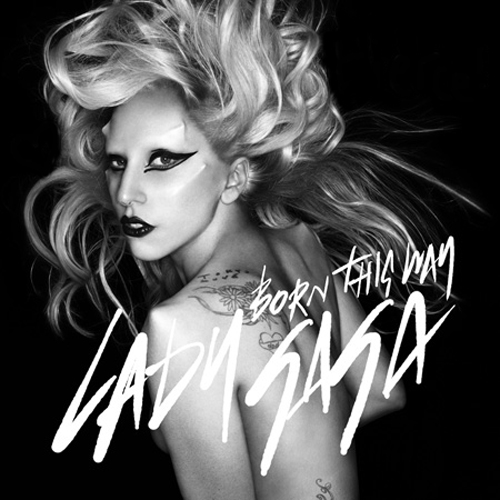

There is no question Lady Gaga's new single, "Born This Way," will be a massive hit. Its catchy, propulsive, four-on-the-floor electro-pop sound is tailor-made for today's radio.
Yet there is also no question, from an artistic standpoint, it does little to distinguish itself from the crowd (Christina Aguilera, Katy Perry, Ke$ha, Glee). Sonically and lyrically, it is following formulas, not re-inventing them or challenging them. The similarities to past hits (Madonna's "Express Yourself," TLC's "Waterfalls") have been well-noted, but the real disappointment is its content. With the Fame/Fame Monster dichotomy, Gaga was tapping into a compelling metaphor about the complexities of identity (and celebrity). It had been done before, of course (most prominently in pop by Michael Jackson), but she was presenting her project in some interesting new ways, particularly in her videos and performances.
The lyrics to "Born This Way," in contrast, are simply a collection of simplistic, one-dimensional platitudes about self-acceptance and empowerment. Rather than challenge her listeners with a fresh slant or expression of liberation, she offers easy self-love. As the Los Angeles Times' Ann Powers notes,
"'Born This Way" never hints that outsiders should remake the world in their image, instead invoking God and mommy to suggest that society's frameworks need not change, only open their doors a little wider... For all her flash and grotesquery, she means to be a steadying force, not a revolutionary."
Obviously, there is a place for such "self-empowerment" songs. They have been populating the pop charts for years. But someone with Gaga's ambition (she has a quote from the German poet, Rilke, on her arm) and talent is capable of far more.
Indeed, she might have learned from two of her artistic heroes, John Lennon and Michael Jackson. Both artists were masters at presenting interesting contrasts, nuances and tensions, even in their popular anthems.
In Lennon's classic, "Instant Karma!," listeners are challenged even as they are inspired. The song undercuts traditional religious sentiments, pushing us to live, not for some future heaven or reward, but in the present. "Why in the world are we here," he sings. "Surely not to live in pain and fear." "Instant Karma" reminds that we are only liberated by transforming ourselves (and the world around us), not simply by celebrating ourselves.
For Gaga, God doesn't make mistakes and we are all born "superstars." For Lennon, a superstar isn't one who simply has good self-esteem. Nor is it someone who aspires to the narcissism and self-congratulation of celebrity ("Who in the hell do you think you are," he sings ironically, "A superstar/ Well, right you are.") Fame, for Lennon, is an illusion, as is the concept of a benign God who makes fully-formed, benign children. For Lennon, we aren't born with everything predetermined -- "It's up to you, yeah you!"
In "Black or White," Michael Jackson similarly offers more than a simple message of "colorblindness" and racial harmony. Both the song and its accompanying music video brilliantly juxtapose idealism with indignation at the status quo. People often forget that Jackson follows the famous chorus ("It don't matter if you're black or white") with the knowing follow-up: "Don't tell me you agree with me/ When I saw you kickin' dirt in my eye." Similarly, in the controversial short film, Jackson follows images of global integration with a fearless coda, in which he embodies the pent-up rage, aggression and pain of discrimination in the form of a black panther.
With his lyrics and use of visual contrasts he also suggests that race is not simply "black or white." We are not simply born one way; nor can we be easily placed in monolithic categories (black, gay, Muslim, etc.). In "Black or White" Jackson clearly identifies as black (note how he blasts the archetypal white American father to Africa to begin his re-education, and later transforms into a black panther). Yet he also makes clear he won't be reduced to a static, one-word box ("I'm not gonna spend my life being a color"). Identity is more than one label and more than skin deep. It is about shared spaces and histories, about experiences and opportunities as much as DNA. The message, then, is not simply to celebrate the ideal of diversity and racial tolerance, but to explore the complexities of how individuals become who they are and the still-pervasive social and emotional impact of discrimination. Like Lennon, then, Jackson doesn't just make us feel good about ourselves; he challenges us to see the world as it is, and as it could be (and as we are, and could be).
The best art has never been mere propaganda or pandering. It is about expressing real emotions, tensions, challenges, and paradoxes.
In her short career, Lady Gaga has established herself as one of the most unique and influential pop artists of a generation. She seemed to be laying the groundwork for a fascinating career with her early work. Yet for all her ambition ("I don't want the five dollars in your pocket, I want your soul") -- and hype from certain colleagues -- "Born This Way" isn't good art. Hopefully, the rest of the album offers more.
Joe Vogel is the author of the forthcoming Man in the Music: The Creative Life and Work of Michael Jackson (Sterling 2011).